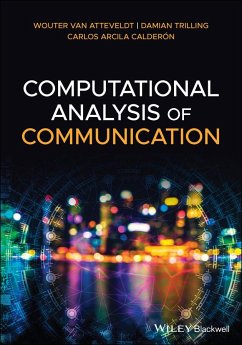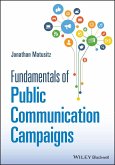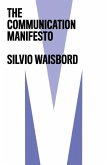Provides clear guidance on leveraging computational techniques to answer social science questions
In disciplines such as political science, sociology, psychology, and media studies, the use of computational analysis is rapidly increasing. Statistical modeling, machine learning, and other computational techniques are revolutionizing the way electoral results are predicted, social sentiment is measured, consumer interest is evaluated, and much more. Computational Analysis of Communication teaches social science students and practitioners how computational methods can be used in a broad range of applications, providing discipline-relevant examples, clear explanations, and practical guidance.
Assuming little or no background in data science or computer linguistics, this accessible textbook teaches readers how to use state-of-the art computational methods to perform data-driven analyses of social science issues. A cross-disciplinary team of authors--with expertise in both the social sciences and computer science--explains how to gather and clean data, manage textual, audio-visual, and network data, conduct statistical and quantitative analysis, and interpret, summarize, and visualize the results. Offered in a unique hybrid format that integrates print, ebook, and open-access online viewing, this innovative resource:
_ Covers the essential skills for social sciences courses on big data, data visualization, text analysis, predictive analytics, and others
_ Integrates theory, methods, and tools to provide unified approach to the subject
_ Includes sample code in Python and links to actual research questions and cases from social science and communication studies
_ Discusses ethical and normative issues relevant to privacy, data ownership, and reproducible social science
_ Developed in partnership with the International Communication Association and by the editors of Computational Communication Research
Computational Analysisof Communication is an invaluable textbook and reference for students taking computational methods courses in social sciences, and for professional social scientists looking to incorporate computational methods into their work.
In disciplines such as political science, sociology, psychology, and media studies, the use of computational analysis is rapidly increasing. Statistical modeling, machine learning, and other computational techniques are revolutionizing the way electoral results are predicted, social sentiment is measured, consumer interest is evaluated, and much more. Computational Analysis of Communication teaches social science students and practitioners how computational methods can be used in a broad range of applications, providing discipline-relevant examples, clear explanations, and practical guidance.
Assuming little or no background in data science or computer linguistics, this accessible textbook teaches readers how to use state-of-the art computational methods to perform data-driven analyses of social science issues. A cross-disciplinary team of authors--with expertise in both the social sciences and computer science--explains how to gather and clean data, manage textual, audio-visual, and network data, conduct statistical and quantitative analysis, and interpret, summarize, and visualize the results. Offered in a unique hybrid format that integrates print, ebook, and open-access online viewing, this innovative resource:
_ Covers the essential skills for social sciences courses on big data, data visualization, text analysis, predictive analytics, and others
_ Integrates theory, methods, and tools to provide unified approach to the subject
_ Includes sample code in Python and links to actual research questions and cases from social science and communication studies
_ Discusses ethical and normative issues relevant to privacy, data ownership, and reproducible social science
_ Developed in partnership with the International Communication Association and by the editors of Computational Communication Research
Computational Analysisof Communication is an invaluable textbook and reference for students taking computational methods courses in social sciences, and for professional social scientists looking to incorporate computational methods into their work.








